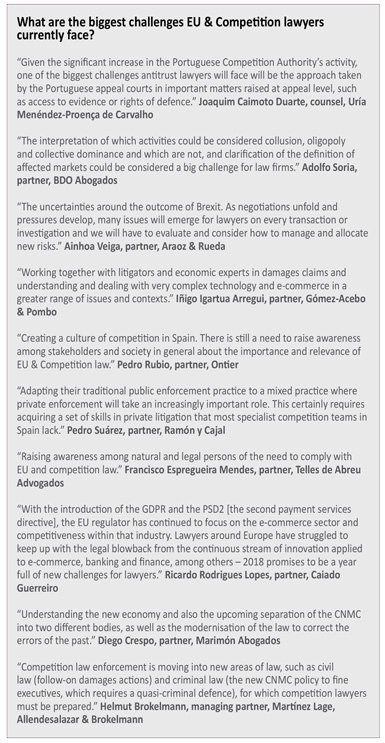EU & Competition Report 2017: Lack of bite
Competition enforcement in Spain has weakened due to uncertainty surrounding the country’s competition authority, though it has increased significantly in Portugal – meanwhile, the EU directive on antitrust damages will make clients less likely to apply for leniency
Competition enforcement in Spain has suffered due to the problems endured by the Spanish competition authority. It is now proposed that the National Commission on Markets and Competition (CNMC) be split into two entities in an effort to make it function better. While this is seen as a positive step, partly because the commission is inviting opinions on how it can improve the way it operates, it has also had negative repercussions – the uncertainty surrounding the organisation has meant that its competition enforcement function has not performed as well as would have been expected. However, the EU Directive on antitrust damages claims will generate opportunities for lawyers. Meanwhile, the There is greater awareness of competition law among clients which is good news for competition lawyers, says one partner. However, lawyers report that “behavioural work” is in decline due to the decline in the CNMC’s activity. Yet more clients are now investing in competition compliance programmes, particularly due to the risk of facing a criminal investigation, according to Baena.
The role of external lawyers in helping to ensure clients do not infringe employment law is still very important, says Ward. “Specialist outside counsel have a breadth of [competition law] expertise that in-house lawyers will rarely have,” he says. Ward believes lawyers in private practice are better placed to benchmark clients’ competition compliance programmes against industry best practice and adds that although smaller organisations specialised in compliance programmes have emerged, full-service law firms have a “significant advantage due to their access to colleagues specialised in data protection, white collar crime and employment law”.
Some competition-related legal work is becoming more commoditised, says Martínez. However, he adds that clients also require more sophisticated advice where the impact of technology is limited and a lot of partner involvement is required as it concerns the interpretation of human behaviour. In general, clients want more information on legal costs and more efficiency from a technological perspective, Baena says. He adds: “Competition law is not a commodity, a lot of expertise is really important to avoid risks.”
 Portugal: Greater enforcement
Portugal: Greater enforcement
In Portugal, the main development in 2017 from a competition perspective has been the Portuguese Competition Authority (PCA) significantly increasing its enforcement efforts, says MLGTS partner Joaquim Vieira Peres. “Throughout the year, the authority carried out extended dawn raids in the retail distribution, insurance, driving schools and rail maintenance sector,” he explains. However, the authority’s actions have been controversial, Vieira Peres adds. “It imposed a fine of €38 million on energy company EDP and supermarket operator Continente for entering into a joint promotional campaign, which the authority viewed as including a horizontal non-compete agreement similar to a cartel,” he says. “The theory of harm of the case is very questionable and the decision has been appealed, but the authority’s views on joint promotional agreements – which are similar to agency agreements – and on the concept of ‘potential competition’ are cause for concern.”
PLMJ partner Ricardo Oliveira echoes the view that the Portuguese competition authority’s enforcement activities have been unprecedented. “It [the PCA] has carried out nearly 40 dawn raids over the past year, which is far in excess of what we’ve seen during prior years,” he says. “The sectors targeted include retail, insurance, railway maintenance, driving instruction and transport.” Oliveira says such activity is generating significant opportunities for law firms.
Decisions in pending cases related to dawn raids carried out by the PCA are keeping law firms busy, says Cuatrecasas partner Ricardo Bordalo Junqueiro. “On the other hand, some landmark competition authority investigations have moved forward which is a positive development, considering the PCA’s reputation for taking a long period of time to investigate cases.”
Competition in the market for EU and competition-related legal service has never been greater, according to Oliveira. “There is an increasing number of law firms developing capabilities to pitch for top-tier competition work,” he says. “This trend has been reinforced by the perception that the regulator’s activism will open up significant opportunities for high added-value work.”
At the EU level, one of the biggest recent developments has been the leading truck producers’ cartel case that has led to “multiple follow-on claims by countless parties, in particular in German courts, which is probably the first real pan-European judicial claim of its sort”, says Luís Romão, senior associate at CMS Rui Pena & Arnaut. He also highlights the European Commission’s e-commerce sector inquiry and the subsequent cases it has brought against some retailers in relation to business practices that restrict competition and limit consumer choice.
EU and competition lawyers in Portugal face a number of challenges connected to global trends, according to Margarida Rosado da Fonseca, of counsel at DLA Piper ABBC. She adds: “For example, growing protectionism and screening of foreign investment, coupled with increased state aid in countries where it is not scrutinised – unlike within the European Union – meaning therefore, there is not a level playing field. These challenges require more pragmatism on the part of lawyers and awareness of clients’ businesses to facilitate legal solutions which suit them best and take into account the overall perspective.”











